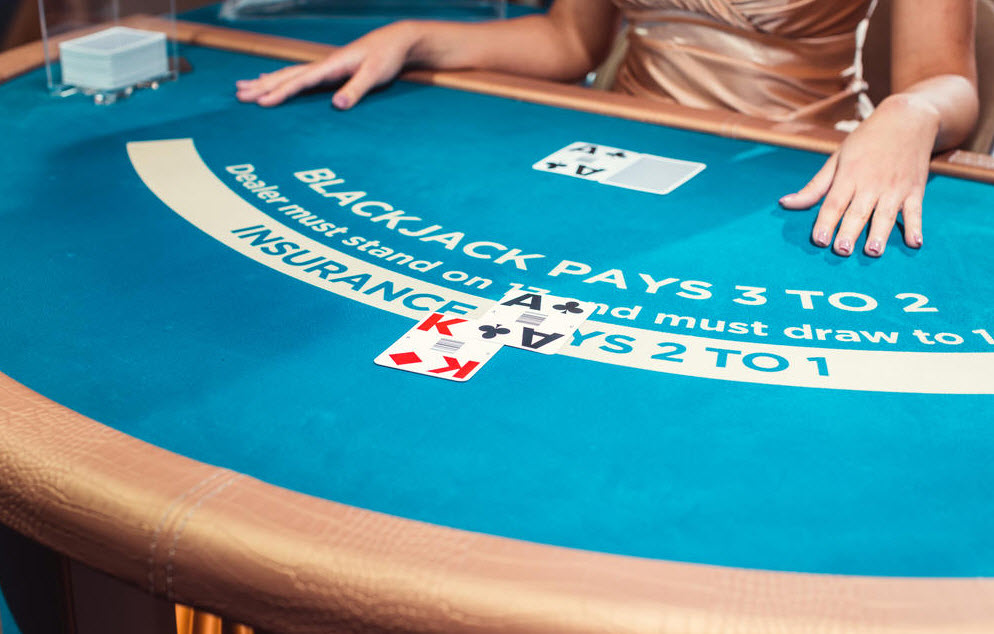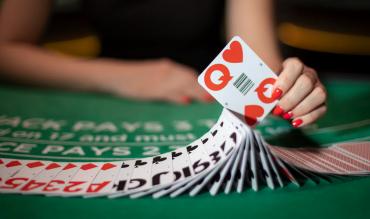Tells aren't just for the poker table. Tells are part of the blackjack card counting world, and avoiding telegraphing your play is crucial to having a successful advantage blackjack career. Here I’m going to discuss some common counter tells.
Bet Spreads
One clear sign that gives away card counters is their bet spreads. This is the difference in the highest bet you place and the lowest bet you place. For those of you that don't know much about card counting in general the goal is to bet more when the count is positive (the deck favors the player because more large cards – Aces and 10-count cards remain) and less or not at all when the count is negative (the deck favors the dealer because there are more small count cards remaining – 2s thru 6s).
There is no rule on what kind of spreads will get noticed. That varies from casino to casino, possibly even shift to shift, but spreading 10 times your minimum bet will likely draw attention. Four or five times your minimum bet is pretty manageable. Don't get greedy.
Splitting face cards or 10s when the count is high will get you noticed. Only idiots or counters split a 20. Basic strategy tells us to never split 10s. There are instances where deviating from basic strategy is very profitable but for the most part the gain from deviation is minimal.
Taking Insurance
Basic strategy says to never take insurance. When the dealer has an Ace up-card showing, you'll be asked if you want to take insurance. Remember insurance pays 2:1 and you can make this separate bet for up to half your original bet. If the dealer has blackjack you lose your original bet, but win the insurance bet at 2:1.
Most people that take insurance do it for the wrong reason and are often rewarded for doing so. Most recreational players take insurance when they have a good hand, such as 20. However, they aren't really insuring their 20; they are betting that the dealer has a blackjack. Except for card counting purposes, the player's hand is irrelevant. In fact, if you are holding a pair of face cards, the dealer's chance of having a blackjack is decreased (-2 toward the running count).
Taking insurance is common among the general blackjack playing world. However, when combined with a large bet that has been increasing, it's probably the most obvious play that is outside the realm of normal plays that card counters will make. It may give off red flags, but a counter will still take insurance.
Surrendering a Hand
Surrender is very hard to find on most blackjack tables the past decade. Chances are most players don't understand it, much less know how to use it properly. When a player surrenders they exchange their first two cards for half their original wager and are no longer involved in the round. It is a favorable player option when used properly.
Just because it's offered, I've found few players take advantage of the surrender option. If you do, and do it correctly, you are identifying yourself as a smart player. If you are a smart player, you might be a card counter.
Play It Cool
One of the easiest ways to be identified as a card counter is to be too uptight or to act paranoid. Learn to keep the running count and carry on a simple conversation. You don't have to talk much, but say “hello” and make the occasional comment. The game is supposed to be fun. There's nothing wrong with smiling after a winning hand or congratulating the table when the dealer busts and everyone wins.
Learn to talk to the dealer and pit boss. Don't be surprised if they ask you where you're from or what you do for a living. Chances are they are just making small talk. Tell them the truth if you like. They probably could care less. I find it best to get the other party talking by turning the tables and getting them to do the talking.
Be cool at the tables and never let them see you sweat. You should be aware of your surroundings and what is going on in the pit area as well as if your table is being watched closely. However, you aren't doing anything wrong if you are card counting, but it's best to not have to go that route.
Avoid suspicious behavior and blend in like any other "dumb gambler." After all, you want to continue to play your favorite game and for the stakes you are comfortable playing, not to mention you want your ratings slip to get into the computer so you can claim whatever comps your play has entitled you to.
Also, DO NOT move your lips or mouth the words when you are counting. For the record, it happens, especially when starting out. Practice at home by listening to loud music or watching television while you silently count down a deck of cards with a smile on your face while singing along or talking to the TV.
Remember, everything in the casino is pretty much there to distract you. Don't let it. If you lose the count, there's no shame in flat betting until the shuffle.

Concepts to Remember
Here we examined some common actions that might identify you as a card counter. Card counting isn't illegal, but is probably the casino manager's biggest fear. Casinos are incredibly paranoid about card counters. That is the biggest reason blackjack conditions have eroded so much in the past years. You have to play, but don't make it easy for them to identify you as a counter.
To summarize:
- You might be a card counter if you spread your bet amounts up and down aggressively. Keep the ranges between four to six units. Don't get greedy.
- You might be a card counter if you split 10s. Nobody splits 10s; do they?
- You might be a card counter if you take insurance, especially on big bets. Why do you think I'm betting big anyway?
- You might be a card counter if you routinely surrender hands correctly. Nobody even knows what surrender is, right?
- You might be a card counter if you are paranoid. Be cool.


